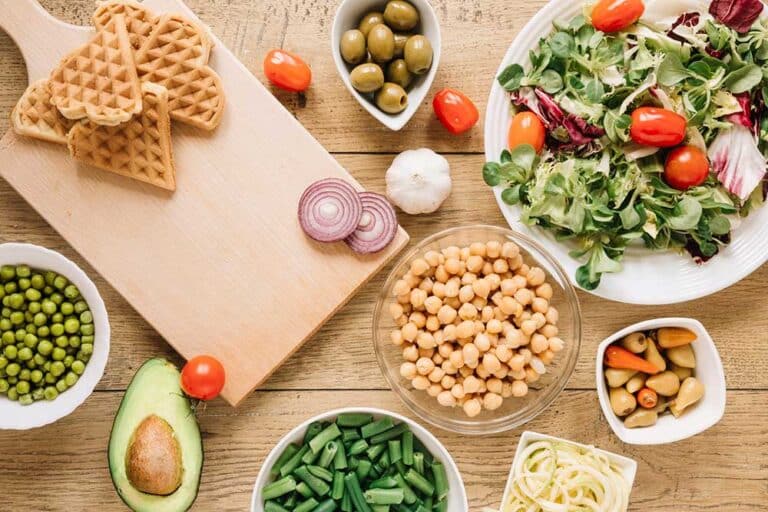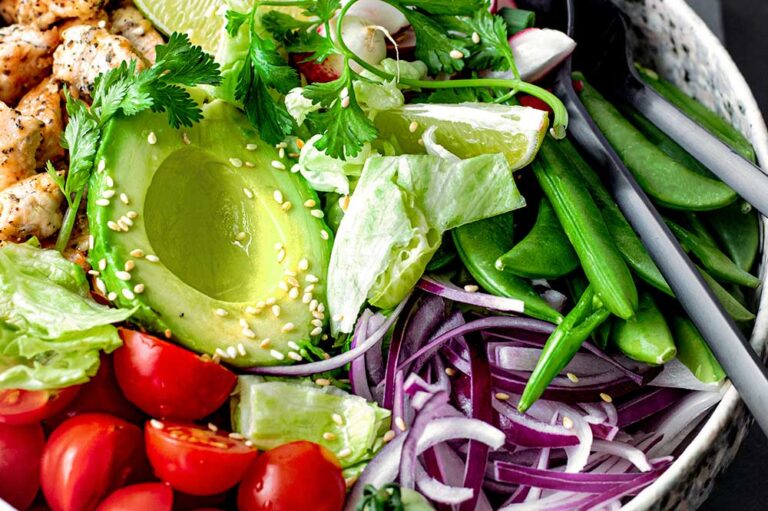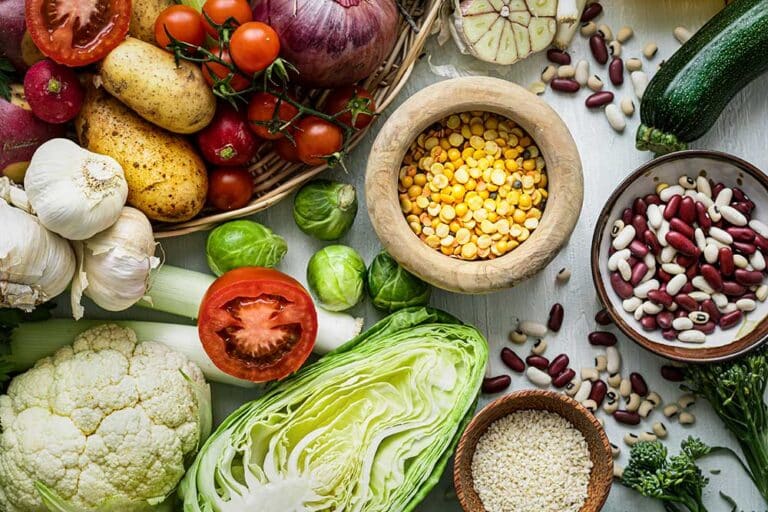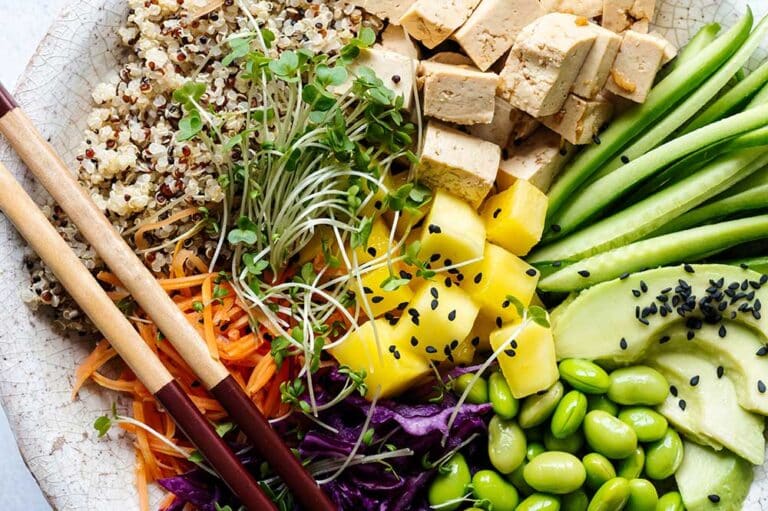Plant-Based Diets for Optimal Health
Benefits of Plant-Based Protein
Plant-based proteins offer an array of health benefits, making them a valuable component of a nutritious diet. These protein sources are not only high in protein but also rich in fiber, vitamins, minerals, and other essential nutrients (American Heart Association). Here are some key benefits of incorporating high-protein plant-based foods into your diet:
-
Improved Heart Health: Plant-based diets are linked to significant reductions in blood pressure and cholesterol levels. Individuals who follow vegetarian diets tend to have lower body weight, a diminished risk of stroke, cancer, and a decreased likelihood of death from heart disease as compared to those who consume meat (Healthline).
-
Blood Sugar Management: A diet rich in nutrient-dense plant foods like whole grains, legumes, and vegetables is associated with better blood sugar control. This can be particularly beneficial for the prevention and management of type 2 diabetes (Healthline).
-
Digestive Health: The fiber content in plant-based proteins aids in digestive health by promoting regular bowel movements and preventing constipation.
-
Reducing Inflammation: Plant-based proteins contain phytonutrients and antioxidants that help reduce inflammation, which is a contributing factor to many chronic diseases.
Importance of Nutrient Variety
When following a plant-based diet, it’s crucial to ensure a variety of nutrient-dense foods to cover all nutritional bases. Here are some reasons why nutrient variety is essential:
-
Preventing Nutrient Deficiencies: A varied diet helps to prevent deficiencies in key nutrients such as vitamin B12, iron, and omega-3 fatty acids. Ensuring a range of plant-based foods can provide all necessary nutrients for optimal health. For more on addressing deficiencies, visit our section on addressing nutrient deficiencies.
-
Complete Proteins: Some plant-based protein sources like quinoa, hemp, soy, and buckwheat provide all nine essential amino acids required by the body. Including a mix of these foods ensures a balance of amino acids in the diet.
-
Enhanced Nutrient Absorption: Different plant foods contain various nutrients that work synergistically to enhance overall nutrient absorption. For instance, consuming vitamin C-rich foods along with iron-rich plant foods can improve iron absorption.
-
Preventing Monotony: A diverse diet prevents boredom and helps maintain long-term adherence to a plant-based eating plan. This way, one can enjoy a variety of flavors and textures.
For more on the benefits of a plant-based diet, see our article on benefits of plant-based eating. To start your plant-based journey, visit how to start a plant-based diet.
| Nutrient Source | Example Foods |
|---|---|
| Protein | Lentils, Chickpeas, Tempeh |
| Iron | Spinach, Pumpkin Seeds, Quinoa |
| Vitamin B12 | Fortified Plant Milks, Nutritional Yeast |
| Omega-3 | Flaxseeds, Chia Seeds, Walnuts |
For delicious high-protein meal ideas, check out our section on plant-based diet recipes.
Health Impact of Plant-Based Diets
Lowered Disease Risk
Adopting a plant-based diet has been associated with numerous health benefits, particularly in reducing the risk of chronic diseases. People who focus on eating high protein plant-based foods such as legumes, nuts, seeds, and whole grains not only benefit from essential nutrients but also experience a decrease in disease risk.
According to the American Heart Association, plant-based protein sources are rich in fiber, vitamins, minerals, and other important nutrients that contribute to better overall health. Studies indicate that plant-based diets are linked to significant reductions in blood pressure compared to diets rich in animal protein (Healthline).
| Health Metric | Risk Reduction |
|---|---|
| Lower Body Weight | ✔️ |
| Lower Cholesterol Levels | ✔️ |
| Reduced Risk of Stroke | ✔️ |
| Lower Cancer Risk | ✔️ |
| Decreased Death from Heart Disease | ✔️ |
Consuming a diet rich in nutritious plant-based foods like whole grains, vegetables, nuts, and seeds has been associated with a lower risk of heart disease (Healthline). Conversely, a plant-based diet high in less nutritious options, such as fried vegetables and refined grains, could be linked to a higher risk of heart disease.
Plant-based diets are also beneficial for blood sugar management and can aid in the treatment and prevention of type 2 diabetes. Nutrient-dense plant foods such as whole grains, fruits, vegetables, nuts, legumes, and vegetable oils are significantly associated with a decreased risk of developing type 2 diabetes.
Moreover, individuals who rely mainly on plants for protein are less likely to experience a stroke, heart disease, and early death. Research has shown that those following a vegan or vegetarian diet are 30% less likely to die from ischemic heart disease compared to meat-eaters (WebMD).
Weight Management and Gut Health
Plant-based diets also offer significant advantages for weight management and gut health. High protein plant-based foods generally contain fewer calories and unhealthy fats compared to animal-based foods, which can help in controlling weight. For tips on incorporating these into your meal plan, check out plant-based diet meal plan.
Plant-based diets are high in fiber, which aids digestion and promotes a healthy gut microbiome. Fiber-rich foods like fruits, vegetables, whole grains, nuts, and seeds support the health of gut bacteria and improve bowel movements. This not only helps in maintaining healthy body weight but also reduces the risk of gastrointestinal issues.
By diversifying the types of plant-based foods consumed, people can ensure they are getting a wide array of nutrients essential for maintaining optimal health. For example, plant-based diet recipes can help integrate a variety of high protein and fiber-rich meals into daily nutrition, fostering both gut health and weight management.
Feel free to explore more about the benefits of a plant-based diet and how to incorporate these practices into a daily routine by visiting how to start a plant-based diet.
Protein Sources in Plant-Based Diets
Achieving a balanced and protein-rich diet is essential for optimal health, especially when following a plant-based lifestyle. Understanding the various protein sources and ensuring a mix of complete proteins is key to maintaining nutritional balance.
High Protein Plant-Based Foods
Incorporating a variety of high-protein plant-based foods can help overcome the risk of inadequate protein intake (Harvard Health Publishing). Here are some popular sources of plant-based protein:
| Food | Protein Content (per 100g) |
|---|---|
| Soy | 36g |
| Quinoa | 14g |
| Nuts (average) | 20-25g |
| Tofu | 8g |
| Lentils | 9g |
| Spinach | 2.9g |
Including these foods in your diet can enhance your protein intake and ensure your body gets the necessary nutrients. Explore our plant-based diet recipes for delicious ways to incorporate these foods into your meals.
Complete Plant-Based Proteins
While many plant proteins are incomplete, meaning they lack one or more essential amino acids, there are several sources that provide all nine essential amino acids required by the body. These complete plant-based proteins ensure a balanced intake of amino acids:
| Food | Essential Amino Acids |
|---|---|
| Quinoa | All 9 |
| Hemp | All 9 |
| Soy | All 9 |
| Buckwheat | All 9 |
By consuming a variety of these foods, you can meet your body’s amino acid requirements without relying on animal proteins. Learn more about the benefits of plant-based eating and how it can improve your overall health.
It’s important to address potential nutrient deficiencies in a plant-based diet by including foods rich in calcium, vitamin D, and other essential nutrients. For more information on how to maintain a balanced diet, visit our article on addressing nutrient deficiencies.
With a well-rounded approach to choosing high-protein plant-based foods, you can enjoy a nutritious and fulfilling diet that promotes optimal health. For more guidance, check out our detailed plant-based diet meal plan and how to start a plant-based diet.
Addressing Nutrient Deficiencies
Adopting a plant-based diet offers numerous health benefits, but it also requires careful planning to ensure all essential nutrients are consumed. This section will explore key nutrients in plant-based diets and how to maintain a well-balanced nutritional profile.
Key Nutrients in Plant-Based Diets
While plant-based diets have many advantages, they may lack certain nutrients that are typically abundant in animal products. These key nutrients include:
- Vitamin B12: Necessary for nerve function and the production of DNA and red blood cells.
- Iron: Essential for transporting oxygen in the blood.
- Calcium: Important for bone health.
- Omega-3 Fatty Acids: Crucial for heart health and brain function.
- Zinc: Supports immune function and DNA synthesis.
- Vitamin D: Helps with calcium absorption and bone health.
- Iodine: Vital for thyroid function.
The table below outlines recommended dietary allowances (RDAs) for these nutrients:
| Nutrient | RDA (Adult) | Plant-Based Sources |
|---|---|---|
| Vitamin B12 | 2.4 mcg | Fortified plant milks, nutritional yeast |
| Iron | 18 mg (women), 8 mg (men) | Lentils, chickpeas, tofu, quinoa, fortified cereals |
| Calcium | 1000 mg | Kale, broccoli, fortified plant milks, tofu |
| Omega-3 Fatty Acids | 1.1 g (women), 1.6 g (men) | Flaxseeds, chia seeds, walnuts, hemp seeds |
| Zinc | 8 mg (women), 11 mg (men) | Pumpkin seeds, lentils, chickpeas, quinoa |
| Vitamin D | 600 IU | Fortified plant milks, sun exposure |
| Iodine | 150 mcg | Seaweed, iodized salt |
Ensuring Nutritional Balance
To maintain a well-rounded plant-based diet and avoid nutrient deficiencies, incorporate a variety of high protein plant-based foods and nutrient-rich options. Here are some strategies:
- Diversify Protein Sources: Include complete plant-based proteins like quinoa, hemp, soy, and buckwheat (Country Life Foods).
- Fortified Foods: Choose fortified plant-based milks and cereals to meet Vitamin B12 and Vitamin D requirements.
- Spread Out Iron Intake: Consume iron-rich foods with vitamin C-rich fruits and vegetables to enhance iron absorption.
- Healthy Fats: Incorporate sources of omega-3 fatty acids from flaxseeds, chia seeds, and walnuts into daily meals.
- Nutrient Supplements: Consider supplements, especially for Vitamin B12 and Vitamin D, after consulting with a healthcare provider.
Maintaining a balanced plant-based diet includes being mindful of these nutrients while reaping the benefits of a diet rich in fiber, antioxidants, and phytochemicals. For more information on optimizing your plant-based diet, visit our comprehensive guide on how to start a plant-based diet. Additionally, explore various plant-based diet recipes to keep your meals both nutritious and delicious.
Ensuring a balanced diet can help mitigate common misconceptions and challenges associated with high protein plant-based foods, offering a path to improved health and wellbeing. Explore more about the benefits of plant-based eating and see how a varied diet can support your health goals.
Plant-Based Diet Recipes
Protein-Rich Vegan Meals
Plant-based diets offer incredible diversity and can be tailored to meet high protein needs. Here are a few protein-rich vegan meals that are both delicious and satisfying.
-
Tofu Noodle Bowl with Almond Butter Sauce
-
This bowl contains a total of 37 grams of protein per serving.
-
Breakdown of protein sources:
- Super firm tofu: 19 grams
- Whole wheat pasta: 7 grams
- Almond butter: 7 grams
-
Garlicky Quinoa and Lentils with Ricotta
-
This recipe offers 33 grams of protein per serving.
-
Breakdown of protein sources:
- Quinoa: 8 grams
- Tofu and nutritional yeast: 10 grams
- Pepitas: 5 grams
- Lentils: 10 grams
-
Protein-Packed Veggie Bowl
-
This balanced meal provides 36 grams of protein per serving.
-
Customizable with additional options like beans, tomatoes, or cabbage.
Quick High-Protein Plant-Based Dishes
For those short on time, quick high-protein plant-based dishes provide the necessary nutrients without compromising on flavor.
-
Easy Chickpea Curry (Chana Masala)
-
Provides 11 grams of protein per serving.
-
Ingredients include chickpeas, garlic, ginger, turmeric, and lemon.
-
Red Lentil Soup
-
Lentils are a fantastic protein source, providing over half of your recommended daily fiber intake in a single cup, and may reduce the risk of several diseases.
-
A single cup of cooked lentils contains 18 grams of protein.
Let’s take a look at a summary of the protein content in these dishes:
| Dish | Protein per Serving (grams) |
|---|---|
| Tofu Noodle Bowl with Almond Butter Sauce | 37 |
| Garlicky Quinoa and Lentils with Ricotta | 33 |
| Protein-Packed Veggie Bowl | 36 |
| Easy Chickpea Curry (Chana Masala) | 11 |
| Red Lentil Soup | 18 |
For more recipes, consider visiting our section on plant-based diet recipes. Additionally, explore other high protein plant-based foods to diversify your diet. If you’re new to this lifestyle, check out our guide on how to start a plant-based diet and our plant-based diet for beginners.
Considerations and Misconceptions
Incorporating high protein plant-based foods into one’s diet can present various challenges and potential risks. Addressing these concerns ensures a balanced and healthful dietary approach.
Protein Intake Challenges
One of the major concerns with plant-based diets is ensuring adequate protein intake. Plant proteins are often incomplete sources of protein, meaning they lack one or more of the essential amino acids needed by the body. However, by consuming a variety of plant proteins, one can achieve a balanced intake of all essential amino acids (WebMD).
A study found that vegans tend to have a lower total protein intake compared to other diet groups, potentially leading to insufficient protein intake (Cureus). This can be mitigated by deliberately including diverse sources of plant-based proteins in daily meals. For more details, see our guide on plant-based diet protein sources.
| Food Source | Protein per 100g (g) | Complete Protein |
|---|---|---|
| Lentils | 9 | No |
| Chickpeas | 8.9 | No |
| Quinoa | 14.1 | Yes |
| Tofu | 8 | Yes |
| Black Beans | 7.6 | No |
Addressing Potential Risks
While plant-based diets offer numerous health benefits, they also come with certain potential risks that need to be managed. For example, some studies have shown that vegetarians and vegans may have an increased risk of stroke compared to meat eaters. These risks are often associated with nutritional deficiencies that can occur if the diet is not well-planned.
Key nutrients that may be lacking in a plant-based diet include vitamin B12, iron, calcium, and omega-3 fatty acids. It is crucial to monitor and supplement these nutrients if necessary to avoid deficiencies. For more information, refer to our section on how to start a plant-based diet.
In spite of these potential risks, vegan and vegetarian diets rich in plant-based proteins have been found to lower inflammation and reduce the risk of chronic illnesses, thanks to the high consumption of fiber-rich foods. For a practical approach on balancing nutrients, explore our plant-based diet meal plan.
Addressing these challenges and risks with informed choices and a balanced dietary approach can help in optimizing the benefits of high protein plant-based foods.
- About the Author
- Latest Posts
Johnnie D. Jackow Sr., the founder and CEO of Total Body Fitness, Worldwide, has a long-standing career in the fitness industry. He began as a certified personal trainer in the mid-90s and soon after authored his first weight loss book in 1998. This led to the launch of Total Body Fitness, Nationwide in the USA at the same time. Johnnie gained recognition as the fitness guru of his time, running infomercials on local TV late at night in Houston, Texas. Over the years, he has helped more than 40,000 individuals from all over the world achieve their health and fitness goals. With over 60,000 hours of documented training in integrative functional medicine, he completed his PhD in human physiology in 2010. His primary objective is to assist people in reaching their health and fitness goals through alternative approaches rather than relying solely on conventional medicine and pharmaceutical drugs. Today, with almost three decades of experience under his belt, Johnnie continues to be a leader in health and fitness.








